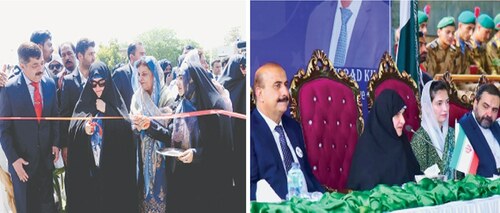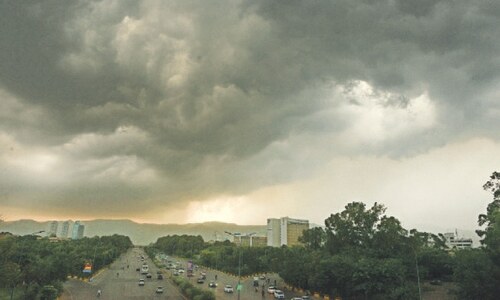ISLAMABAD, March 12: A two-member division bench of Islamabad High Court (IHC) on Tuesday suspended the order of a single bench against collection of the gas infrastructure development cess (GIDC) from industrial and commercial consumers.
With this, the Gas Infrastructure Development Cess (GIDC) Act 2011 has been restored for the time being, which enabled the distribution companies to collect the levy from the consumers.
On January 31, the single bench of Justice Shaukat Aziz Siddiqui in its short order had declared the Act unconstitutional and asked the distribution companies to return the amount they had collected from the industrial and commercial consumers since January 2012. The court order was passed on a number of petitions filed by industrial and commercial consumers, On Tuesday, the division bench of the IHC, comprising Justice Riaz Ahmed Khan and Justice Mohammad Noorul Haq N.
Qureshi, suspended the short order of Justice Siddiqui till it issues a detailed judgment in the case. The final verdict would be announced after hearing about 300 petitioners who had initially filed the case with the IHC.
Domestic consumers were, however, exempted from the levy which the federal government had imposed on the industrial sector initially at the rate of Rs13 per mmbtu (million metric British thermal units) in January 2012. In August 2012, it was increased to Rs100 per mmbtu only to be cut down to Rs50 per mmbtu in September the same year.
Over 400 industrial units challenged the GIDC in the Islamabad High Court in September 2012, saying it had increased their cost of production.
The petitioners contended that the levy was imposed to finance the infrastructure for the proposed Turkmenistan-Afghanistan-Pakistan-India (TAPI) and Iran-Pakistan (IP) gas pipeline projects or for price equalisation of other imported alternative fuels, including LNG and LPG.
According to the petitioners, no timelines could be determined for the launching and the costs of these projects and the government had imposed the cess and increased its rates without any justifications.
The GIDC Act was also passed in haste and without fulfilling the constitutional requirements, they maintained, adding the increases in the rate of the cess were communicated by the Oil and Gas Regulatory Authority (Ogra) through press statements. They said Ogra had no authority to impose any levy over and above the tariff which it had already notified.
Advocate Shah Khawar, Anwar Mansoor Khan and Salman Akram Raja represented the federal government and the ministry of petroleum.
Advocate Khawar told the court that a number of petitions against the cess were pending in the Lahore and Sindh high courts when the IHC single bench declared the Act illegal.
He contended that the single bench through a short order had declared an Act of parliament as illegal and a detailed judgment was yet to come.
He said the judge did not give reason for declaring the Act as illegal. Because of this order, the Lahore and Sindh high courts issued stay orders in favours of the petitioners who had challenged the Act.
According to him, the GIDC could not be termed illegal or unconstitutional because imposition of taxes was the prerogative of the government.
The GIDC was introduced after necessary legislation and could not be set aside by the court.
The levy never violated the fundamental rights of the citizens; therefore, it could not be declared unconstitutional, the counsel added.
The bench also issued notices to all the petitioners to hear their point of view and adjourned the hearing till a date to be fixed by the registrar office.
According to economists, the government is expected to collect Rs102 billion per annum in the shape of the gas infrastructure development cess.
Economist Abid Qayyum Sulehri, the executive director of the Sustainable Development Policy Institute (SDPI), told Dawn that Pakistan was currently facing an energy crisis and the planned projects needed billions of dollars to be materialised.
He said GIDC would contribute a little to the projects which were in the pipeline.
Mohammad Nawaz, a research scholar with the Pakistan Institute of Development Economics (PIDE), added that GIDC-like initiatives would pay back to the consumers after a long time as these were long run initiatives.
In developing countries like Pakistan, he said, consumers, especially industrial And commercial, did not want long-run initiatives and preferred short-term projects.
Because of the uncertain political and economic situation, consumers have a tendency to challenge these sorts of proposals in the courts.
The GIDC was also challenged in the court because the consumers wanted to save their income for the time being without realising their future energy requirements, Mr Nawaz remarked.
ISLAMABAD, March 12: A two-member division bench of Islamabad High Court (IHC) on Tuesday suspended the order of a single bench against collection of the gas infrastructure development cess (GIDC) from industrial and commercial consumers. With this, the Gas Infrastructure Development Cess (GIDC) Act 2011 has been restored for the time being, which enabled the distribution companies to collect the levy from the consumers. On January 31, the single bench of Justice Shaukat Aziz Siddiqui in its short order had declared the Act unconstitutional and asked the distribution companies to return the amount they had collected from the industrial and commercial consumers since January 2012. The court order was passed on a number of petitions filed by industrial and commercial consumers, On Tuesday, the division bench of the IHC, comprising Justice Riaz Ahmed Khan and Justice Mohammad Noorul Haq N. Qureshi, suspended the short order of Justice Siddiqui till it issues a detailed judgment in the case. The final verdict would be announced after hearing about 300 petitioners who had initially filed the case with the IHC. Domestic consumers were, however, exempted from the levy which the federal government had imposed on the industrial sector initially at the rate of Rs13 per mmbtu (million metric British thermal units) in January 2012. In August 2012, it was increased to Rs100 per mmbtu only to be cut down to Rs50 per mmbtu in September the same year. Over 400 industrial units challenged the GIDC in the Islamabad High Court in September 2012, saying it had increased their cost of production. The petitioners contended that the levy was imposed to finance the infrastructure for the proposed Turkmenistan-Afghanistan-Pakistan-India (TAPI) and Iran-Pakistan (IP) gas pipeline projects or for price equalisation of other imported alternative fuels, including LNG and LPG. According to the petitioners, no timelines could be determined for the launching and the costs of these projects and the government had imposed the cess and increased its rates without any justifications. The GIDC Act was also passed in haste and without fulfilling the constitutional requirements, they maintained, adding the increases in the rate of the cess were communicated by the Oil and Gas Regulatory Authority (Ogra) through press statements. They said Ogra had no authority to impose any levy over and above the tariff which it had already notified. Advocate Shah Khawar, Anwar Mansoor Khan and Salman Akram Raja represented the federal government and the ministry of petroleum. Advocate Khawar told the court that a number of petitions against the cess were pending in the Lahore and Sindh high courts when the IHC single bench declared the Act illegal. He contended that the single bench through a short order had declared an Act of parliament as illegal and a detailed judgment was yet to come. He said the judge did not give reason for declaring the Act as illegal. Because of this order, the Lahore and Sindh high courts issued stay orders in favours of the petitioners who had challenged the Act. According to him, the GIDC could not be termed illegal or unconstitutional because imposition of taxes was the prerogative of the government. The GIDC was introduced after necessary legislation and could not be set aside by the court. The levy never violated the fundamental rights of the citizens; therefore, it could not be declared unconstitutional, the counsel added. The bench also issued notices to all the petitioners to hear their point of view and adjourned the hearing till a date to be fixed by the registrar office. According to economists, the government is expected to collect Rs102 billion per annum in the shape of the gas infrastructure development cess. Economist Abid Qayyum Sulehri, the executive director of the Sustainable Development Policy Institute (SDPI), told Dawn that Pakistan was currently facing an energy crisis and the planned projects needed billions of dollars to be materialised. He said GIDC would contribute a little to the projects which were in the pipeline. Mohammad Nawaz, a research scholar with the Pakistan Institute of Development Economics (PIDE), added that GIDC-like initiatives would pay back to the consumers after a long time as these were long run initiatives. In developing countries like Pakistan, he said, consumers, especially industrial and commercial, did not want long-run initiatives and preferred short-term projects. Because of the uncertain political and economic situation, consumers have a tendency to challenge these sorts of proposals in the courts. The GIDC was also challenged in the court because the consumers wanted to save their income for the time being without realising their future energy requirements, Mr Nawaz remarked.













































Dear visitor, the comments section is undergoing an overhaul and will return soon.